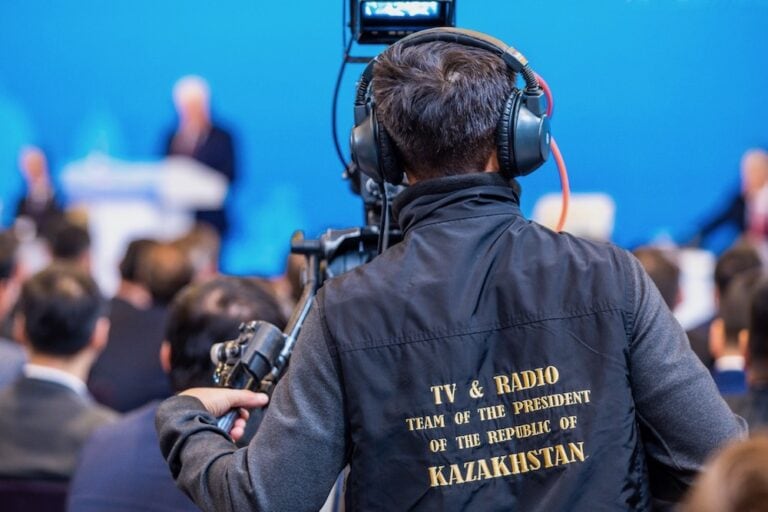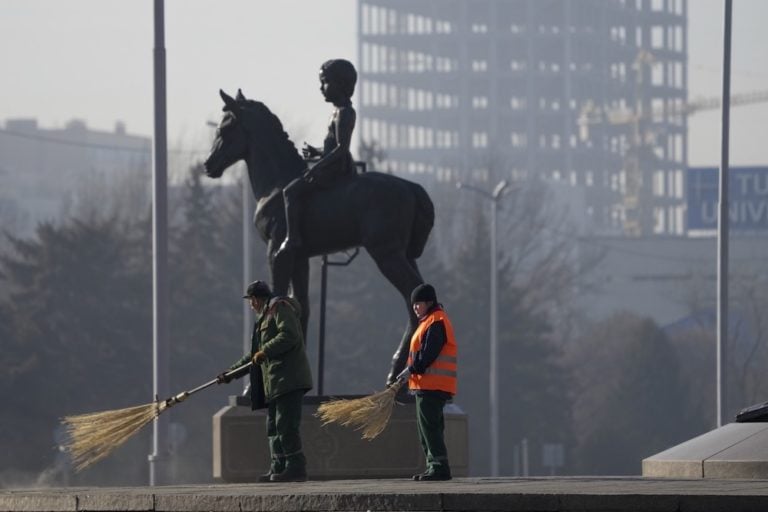The ban on independent and opposition media is being sought on the grounds of alleged "extremist propaganda." There has been a sharp increase in harassment of Kazakhstan's main independent news sources in the period since the Zhanaozen riots of 2011.
(RSF/IFEX) – 21 November 2012 – Reporters Without Borders is appalled by today’s announcement by the prosecutor-general’s office that it has asked an Almaty court to ban the main independent and opposition national media.
“We urge the court to reject the request, which is extremely dangerous for freedom of information in Kazakhstan,” Reporters Without Borders said. “If granted, pluralism would quite simply cease to exist in this country. The government is using the pretext of combatting extremism to launch an unprecedented offensive against its critics.
“The international community must react very firmly to this latest demonstration of the government’s draconian tendencies. It will be too late when this regional giant has fully adopted the ultra-authoritarian model of its Uzbek and Turkmen neighbours.
“It is particularly ironic that Kazakhstan is one of the 18 new members of the United Nations Human Rights Council elected on 12 November. If the Kazakh courts do ban independent news outlets, we will formally request Kazakhstan’s exclusion from the Human Rights Council.”
The announcement was made at a news conference today by prosecutor-general’s office spokesman Nurdaulet Suindikov, who said the Almaty prosecutor’s office yesterday asked a court to recognize the “extremist” nature of the two main opposition parties, Alga and Khalyk Maydany, and to ban the main independent media.
The prosecutor’s office is seeking a ban on the newspaper Respublika (and all associated newspapers), the newspaper Vzglyad, the satellite TV station K+, the news portal Stan.tv, and all of the websites linked to these media. Respublika appears under many alternative names because it has been the target of judicial persecution for years.
The request follows an appeal court’s decision on 19 November to uphold a seven-and-a-half year jail sentence on Alga leader Vladimir Kozlov for his alleged role in rioting by striking oil workers in the western city of Zhanaozen, which was put down with a great deal of bloodshed in December 2011 .
For the past year, prosecutors have been trying to portray the riots as an attempted coup orchestrated by the opposition and supported by certain media. The ban on independent and opposition media is being sought on the grounds of alleged “extremist propaganda” under article 13 of the mass media law.
The prosecutor-general’s office spokesman cited the verdict in the Kozlov trial: “The implicit content of what was published […] was designed to foment social hatred […] analysis of [their] content has demonstrated the presence of propaganda in support of seizing power by force and destroying state security.”
There has been a sharp increase in harassment of Respublika, Vzglyad, K+ and Stan TV – Kazakhstan’s main independent news sources – in the period since the Zhanaozen riots, which has also been marked by social unrest and a war of succession within government circles.
This harassment has taken the form of arrests, interrogation by the security services, “inspections” of all kinds and various threats.
Ranked 154th out of 179 countries in the latest Reporters Without Borders press freedom index, Kazakhstan is one of the countries “under surveillance” by Reporters Without Borders because of its growing use of cyber-censorship.
The charge of “extremism” was already used in August 2011 as grounds for blocking access to LiveJournal, a blog platform very popular in Kazakhstan.


